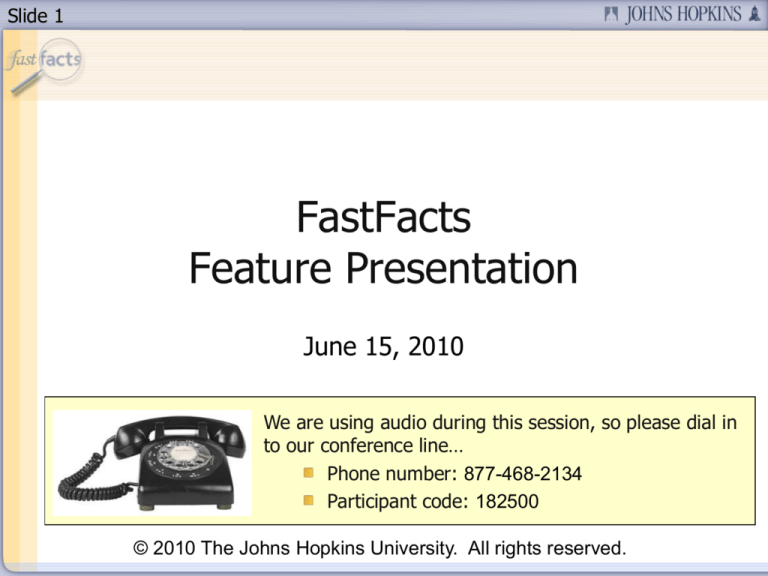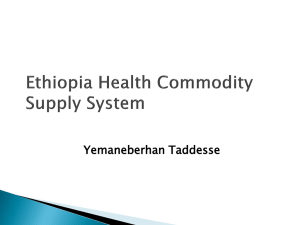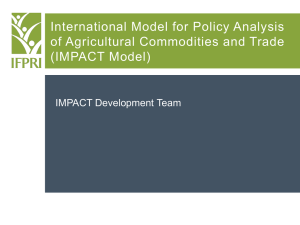
Slide 1
FastFacts
Feature Presentation
June 15, 2010
We are using audio during this session, so please dial in
to our conference line…
Phone number: 877-468-2134
Participant code: 182500
© 2010 The Johns Hopkins University. All rights reserved.
Slide 2
Today’s Topic
We’ll be taking a look at…
Procurement and Property
Standards
Slide 3
Today’s Presenter
JoAnn Theys
Jhpiego
Slide 4
Session Segments
Presentation
JoAnn will focus on property and procurement standards with a
special emphasis on source, origin and nationality for
commodities and service purchases for USAID.
During JoAnn’s presentation, your phone will be muted.
Q&A
After the presentation, we’ll hold a Q&A session.
We’ll open up the phone lines, and you’ll be able to ask
questions.
JoAnn will answer as many of your questions as time allows.
Slide 5
Contact Us
If you would like to submit a question during the presentation or if
you’re having technical difficulties, you can email us at:
fastfacts@jhu.edu
You can also send us an instant message!
GoogleTalk – HopkinsFastFacts@gmail.com
AOL Instant Messenger – HopkinsFastFacts
MSN – FastFacts@jhu.edu
Slide 6
How To View Full Screen
Slide 7
Survey
Survey
At the end of this FastFacts session, we’ll ask you to complete a
short survey.
Your honest comments will help us to enhance and improve
future FastFacts sessions.
Slide 8
Administering a USAID Award –
Property and Procurement
Standards
Slide 9
General Agenda
Review key definitions
Review 22CFR226 – Administration of Assistance
Awards to Non-Governmental Organizations
Subpart C—Post-award requirements - property
standards, and procurement standards
Review 22CFR228 - Rules on Source, Origin and
Nationality for Commodities and Services
Subpart A—Definitions and scope
Subpart B—Conditions governing source and
nationality of commodity procurement transactions
Key references
Slide 10
22CFR226 Definitions
Equipment
226.2
Tangible
Non-expendable
Including exempt
property
Charged directly to the
award
Having a useful life > 1
year
An acquisition cost ≥
$5,000 per unit
Equipment - JHU
Tangible
Non-expendable
Having a useful life > 1
year
An acquisition cost ≥
$5,000 per unit
Slide 11
Definitions
Federal share of real property, equipment, or
226.2
supplies means that % of the property's
acquisition costs and any improvement
expenditures paid with Federal funds.
Prior approval means written approval by an
authorized official evidencing prior consent.
Your Agreement Officer (“AO”), NOT the Agreement
Officer’s Technical Representative – called the “AOTR”
Supplies means all personal property excluding
equipment, intangible property, and debt
instruments.
Slide 12
Property Standards
What is covered in 22CFR226, Subpart C?
Real property (land, buildings, structures)
Federally-owned property
Exempt property
Equipment
Supplies
Intangible property (trademarks, patents,
copyrights)
226.32
226.33.a
226.33.b
226.34
226.35
226.36
Slide 13
Equipment
Title vests with recipient, unless
otherwise stated in the award document
Must charge non-Federal outside
organizations a market rate for use
May use on other USAID programs (first),
or other Federally sponsored programs
(second)
When replacing, use trade-in value or
sale proceeds to offset costs
USAID retains financial interest
USAID reserves right to transfer title
226.34.a
226.34.b
226.34.d
226.34.e
226.34.g
226.34.h
Slide 14
Equipment
Use for intended purpose
226.34.c.1-2
When no longer needed for the original project,
use the equipment in connection with other
federally-sponsored activities - order of priority:
(1) Activities sponsored by USAID
(2) Activities sponsored by other Federal agencies
(3) Non-Federal activities
– Current Fair Market Value (FMV) ≥ $5,000,
compensate USAID by applying the % of Federal
participation in the original cost to the current FMV
(4) No longer needed at all
– Request disposition instructions from the
Agreement Officer
226.34.g
226.34.g
Slide 15
Property Standards
Maintain proper equipment records
Properly identify assets (tagging)
Document physical inventory
226.34.f.1
226.34.f.2
226.34.f.3
At least once every two years
Maintain adequate internal controls
Perform routine maintenance
Maintain and document proper disposition
procedures
226.34.f.4
226.34.f.5
226.34.e
226.34.f.6
226.34.g
Slide 16
Supplies
Title vests with recipient upon acquisition
At the end of project, > $5,000 residual
unused supplies (combined value)
226.35.a
226.35.a
USAID retains financial interest
Use in other Federally-sponsored projects
Use in non-Federal sponsored activities, but
compensate USAID
Compensation calculated as with equipment
Must charge non-Federal outside
organizations a market rate for use
226.35.b
Slide 17
22CFR228 Definitions
SOURCE = the country from which a
228.01.l
ORIGIN = the country where a
228.01.j
commodity is shipped.
commodity is mined, grown or
produced.
NATIONALITY = For purposes of
USAID's procurement rules, nationality
refers to the place of incorporation,
ownership, citizenship, residence, etc.
of suppliers of goods and services.
ADS
Glossary
Slide 18
Scope
Applies to goods and services financed
with USAID funds
228.02
Does not apply to cost share
Award document identifies the authorized
geographic code
000 = United States
941 = The U.S. and any independent
country (except foreign policy restricted
countries), except the cooperating country
935 = Any area or country (except foreign
policy restricted countries), including the
cooperating country (“special free world”)
228.11.a
Slide 19
Scope
Never purchase from a foreign policy
restricted country
Libya, Cuba, Laos, Iran, Iraq, North Korea,
and Syria
228.11.b
Slide 20
Commodity Source & Nationality
COMMODITY = any material, article,
supply, goods, or equipment
Includes commodities obtained under a
long-term lease; a single lease of more than
180 days, or repetitive or intermittent leases
under a single activity or program within a
one-year period, totaling more than 180
days, for the same type of commodity
Some items must be procured from the
U.S. (unless prior written approval is
obtained)
Also applies to nationality of suppliers
228.01.a
228.12
228.13.a-c
228.14.a
Slide 21
Restrictions
Ineligible goods and services
Cannot be procured under any circumstances
Mandatory
Standard
Provision
#9
Restricted goods
Need prior approval from the Agreement Officer
Ineligible suppliers
Cannot procure from firms or individuals whose
name appears on the “Lists of Parties Excluded from
Federal Procurement and Nonprocurement Programs”
(also called the “Excluded Parties List System” or
“EPLS”)
Slide 22
Restrictions
Ineligible goods and services (what you
CANNOT buy)
Mandatory
Standard
Provision
#9
Abortion equipment and services
Luxury goods and gambling equipment
Weather modification equipment
Military equipment
Surveillance equipment
Commodities and services for support of police or
other law enforcement activities
Slide 23
Restrictions
Restricted goods (what you need PRIOR
APPROVAL for before buying)
Motor vehicles (includes trucks, cars, buses,
motorcycles, utility vehicles, and motorized
bicycles)
Pharmaceuticals
Used equipment
U.S. Government-owned excess property
Agricultural commodities
Pesticides
Fertilizer
Mandatory
Standard
Provision
#9
Slide 24
Restrictions
Special Source goods (what requires
procurement from the UNITED STATES)
Motor vehicles (includes trucks, cars, buses,
motorcycles, utility vehicles, and motorized
bicycles)
Pharmaceutical products
Agricultural commodities
Procurement from anywhere OTHER than
the United States requires a waiver, in
writing, prior to purchase, from the AO.
228.13.a-c
Slide 25
Restrictions
Motor Vehicle example
To purchase any type of “motor vehicle” (truck, car,
bus, motorcycle, utility vehicle, or motorized bicycle),
you need the following written documentation from
your AO (NOT the AOTR)
Prior approval to purchase the motor vehicle, because it is a
“restricted” good
A source and origin waiver prior to purchasing the motor
vehicle if it is non-U.S. source and origin, because it is a
“special source” good
Slide 26
Local Procurement
Definition - Procurement of goods and
services supplied by local businesses,
dealers or producers, with payment
normally being in the currency of the
cooperating country
NOTE – Eligibility is based on transaction
value, not unit value
228.40
Slide 27
Local Procurement
Unless award says otherwise:
Locally available US origin commodities with a
transaction value $100,000 (excluding
transportation)
228.40.a
Geographic code 935 commodities with a
transaction value $5,000
228.40.b
Professional services contracts $250,000
Not including materials
Construction services contracts $5,000,000
No limit with fixed-price construction contract
Commodities/Services only available locally
Examples – utilities, communications, trash collection,
etc.
228.40.c
228.40.d
228.40.e
228.40.f
Slide 28
Key References
22CFR226 – Administration of Assistance Awards
to U.S. Non-Governmental Organizations
22CFR228 – Rules on Source, Origin and
Nationality for Commodities and Services Financed
by USAID (NOTE – includes geographic codes)
ADS Glossary
JHU Definition of Equipment
Excluded Parties List System (EPLS)
JHU Overseas Procurement Policy
Slide 29
Key References
ADS Chapter 310 = Source, Origin and
Nationality of Commodities
ADS Chapter 312 – Eligibility of Commodities
Procurement Executive’s Bulletin (PEB) No.
2008-05 – HIV/AIDS Expedited Procedures
Package – FAQ’s
Purchasing or leasing non-U.S.-manufactured
vehicles and ARVs
Applicable only to PEPFAR-funded programs
Effective 14 February 2008 – 13 February 2013
Slide 30
Conclusion
Today we covered:
Key definitions
22CFR226 – Administration of Assistance Awards
to Non-Governmental Organizations
Subpart C—Post-award requirements - property
standards, and procurement standards
22CFR228 - Rules on Source, Origin and
Nationality for Commodities and services
Subpart A—Definitions and scope
Subpart B—Conditions governing source and
nationality of commodity procurement transactions
Key references
Slide 31
Q&A
We’re going to open the phone lines now!
There will be a slight pause, and then a recorded voice will provide
instructions on how to ask questions over this conference call line.
We’ll be answering questions in the order that we receive them.
We’ll also be answering the questions that were emailed to us
during the presentation.
If there’s a question that we can’t answer, we’ll do some research
after this session, and then email the answer to all participants.
Slide 32
Thank You!
Thank you for participating!
We would love to hear from you.
Are there certain topics that you would like us to cover in future
FastFacts sessions?
Would you like to be a FastFacts presenter?
Please email us at: fastfacts@jhu.edu
Slide 33
Survey
Before we close, please take the time to complete a short survey.
Your feedback will help us as we plan future FastFacts sessions.
Click this link to access the survey…
http://connect.johnshopkins.edu/fastfactssurvey/
Thanks again!










